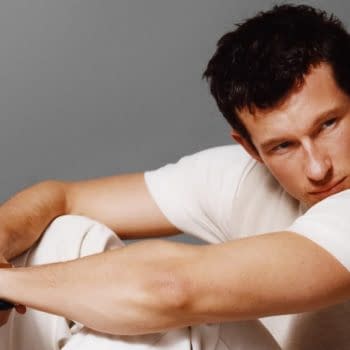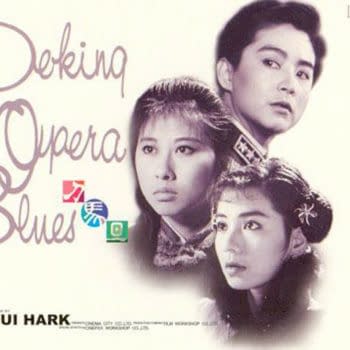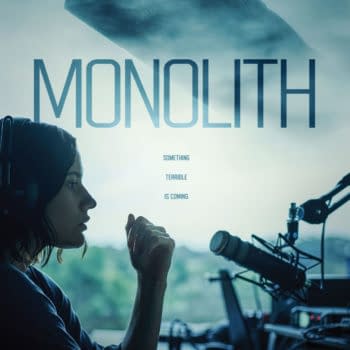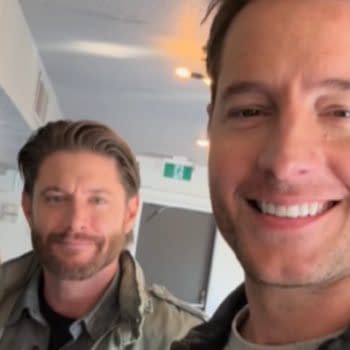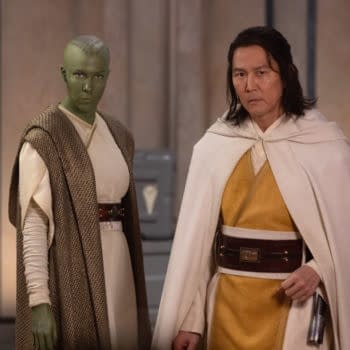Posted in: TV | Tagged: a24, alicia vikander, HBO, Irma Vep, Les Vampires, Louis Feuillade, Maggie Cheung, Musidora, Olivier Assayas
Irma Vep: A Personal Look at Lost Love, History and Show Business
Irma Vep isn't just a story about a Hollywood star going to Paris to star in a troubled remake of an old French classic with an unstable director on the verge of a nervous breakdown and taking the production with him. Writer-director Olivier Assayas turns it into a hall of mirrors that combines a history lesson about the original French silent movie thriller Les Vampires, a deconstruction of the original, and a commentary about filmmaking, even his own relationship with the original 1996 movie. If you skipped the show after the first episode, you'll miss the increasing weirdness, layers of complexity and escalating farce, surrealism, and comedy.
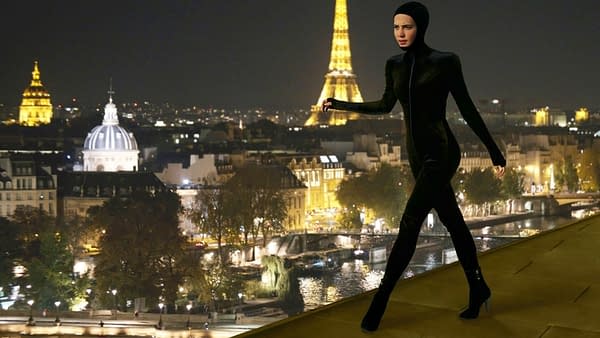
The Remake
Irma Vep, the TV miniseries, is a sequel and a reboot of the 1996 movie where Maggie Cheung plays a Hong Kong movie star that's a version of herself who goes to Paris to star in a troubled remake of an old French classic with an unstable director on the verge of a nervous breakdown and taking the production with him. In that version, the director was played by Jean-Pierre Léaud, who starred in many of Francois Truffaut's movies and thus embodied the French New Wave in the 1960s. That version of fictional director Rene Vidal represented the Old Guard of French Cinema that was on the way out. He was burned out, unstable, and trying to draw inspiration from the fresh ideas of Hong Kong Cinema, then at its peak with its unique and unpredictable action movies and an emerging arthouse movement led by the movies of Wong Kar-Wai and Stanley Kwan in which Maggie Cheung appeared as a kind of muse. Maggie was a stranger in a strange land and was exoticized by the people around her, who see in her their fantasies of the East, including erotic ones. She takes to the rooftops in her latex catsuit to escape the chaos and even becomes Irma Vep momentarily, prowling like the real first femme fatale of Cinema.
The 2022 TV version of Irma Vep loosely follows the story of the 1996 movie, but Assayas uses the larger canvas of the 8 episodes to have more nuanced commentary. Mira Harberg (Alicia Vikander) represents an actress disaffected with the vapidity of Hollywood stardom and yearning for more artistic work rather than empty blockbusters. The director of the TV version of Irma Vep Rene Vidal (Victor Macaigne) represents not only the dysfunction of the French film industry and the unpredictability of the Artist once again but is a more direct stand-in for Assayas, though the real Assayas isn't known to be a maniac who gleefully endangers his actors.
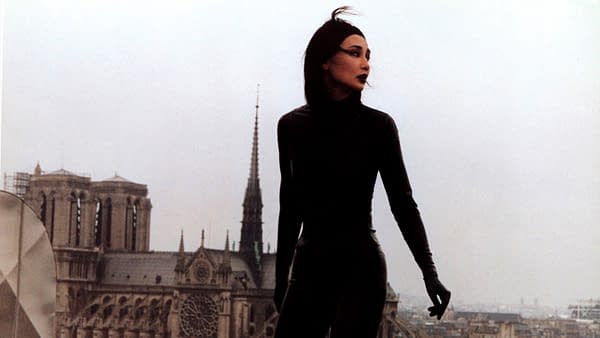
The Deconstruction of Movie History
The TV series gave Assayas an opportunity to examine and pay tribute to the original 1915-1916 silent movie Les Vampires which inspired both his 1996 movie and this series. Viewers are treated to clips from the original silent movie and scenes from Rene Vidal's TV miniseries remake that Mira stars in. The show also pays tribute to Musidora, the original stage actress who played Irma Vep, and her place in French and Cinema history, giving a context to the story that the 1996 movie didn't get to do. There's an added layer in the scenes that recreate incidents from Musidora's memoirs where she recounts the making of Les Vampires. Mira/Vikander plays Musidora as she visits the Paris Commissioner of Police, who banned the filming of the movie, fearing moral corruption because it seemed to glorify the criminal mayhem of Irma Vep and the Vampires. Musidora also recalls the extremely dangerous stunts original director Louis Feuillade subjected her and the actors to since there were no stunt men or doubles in those days. Macaigne plays Feuillade as the opposite of Rene: steely, nonchalant, and practical as he matter-of-factly permits a cannon and live explosives to go off on set, then declaring that the actors who were injured will get their salaries tripled.
It's not straight-up worship of Les Vampires, though. Rene's cast, including Mira, constantly question the plot points of the original movie, pointing out that their characters' actions and decisions make no sense, and are even outright ridiculous even by the standards of 1915, let alone 2022, which drives an already unstable Rene crazy. One of the actors and several crew members protest that the pivotal scene where a major villain abducts and menaces Irma Vep constitutes rape, even though there was nothing explicit, driving an exasperated Rene to throw a tantrum as he tries and fails to explain the subtext of kink and sexual fantasy in escapism since the questions about how female characters are depicted for the gratification of male viewers fits in a post-Me Too era, and whether it's okay to show women being menaced by male predators for fun.
The Showbiz Comedy
Irma Vep starts out as a satire of show business that also perpetuates the myth of crazy directors, insecure actors, and chaotic movie sets. Mira hides her heartbreak and existential malaise behind a wistful smile and escaping into the chaotic, dysfunctional world of the French film industry, the same one in the 1996 movie. Like the movie, it's a critique of both the dysfunction of the French industry and the soullessness of the Hollywood machine. Rene's production is on the verge of falling apart, and his remake of Irma Vep is a loss-leader by the perfume company financier who wants Mira to be their spokesperson. Mira's agent (Carrie Brownstein) anticipates the collapse of the production with glee so that she can be freed to star in a blockbuster reboot of The Silver Surfer. It's also a comedy of directors and actors at war with each other, with Rene sadistically retaliating against actors who argue with him that he decides are a pain in his ass. Rene is so unstable that he might be outright psychotic, just one nervous breakdown away from the whole production falling apart.
Lars Eidinger plays Gottfried, a hilarious stereotype of a depraved German actor possibly inspired by the antics of Klaus Kinski and other chaotic actors, a doomed wild card addicted to drugs, alcohol, and risky sex who nonetheless keeps getting work because he's a consummate professional on set.
The Personal Essay
For all the fun and comedy, Irma Vep is a deeply personal story for its writer-director. Olivier Assayas is a French film industry lifer. His father was a filmmaker, and he was a film critic for the influential magazine Le Cahiers du Cinema before becoming a filmmaker himself. Irma Vep is his examination of the history of movies and how deeply they're a part of his personal life.
At the centre of the story is the mystery of Maggie Cheung's absence. Assayas married her in real life after they met in the 1996 movie. A few years later, they split up, and she quietly retired from movies, her last being the 2002 movie Clean, also written and directed by Assayas, after she starred in Zhang Yimou's Hero, Wong Kar Wai's In the Mood for Love and 2046. She declined to appear in the show by email but gave Assayas her permission to tell the story. Rene becomes Assayas' stand-in when her fictional stand-in Jade Lee (Vivian Wu) appears to him as a spirit to him in the dead of night. This is where the show becomes "magical realist," and Mira also takes on the persona of Irma Vep as Maggie did in the movie. At this point, Irma Vep becomes a ghost story about the ghosts of Cinema history and lost love. Rene has the conversation with Jade that Assayas wishes he had with Maggie Cheung, lamenting the end of their marriage and the enigma of her disappearance from the movie industry that she never publicly explained.
Near the end, Rene tells Mira that Irma Vep is a spirit, not just the archetype of the femme fatale, but a spirit of Cinema, escapism, empowerment, fantasy, and transcendence. That's when the show takes on another layer, transcending realism and naturalism as Mira becomes Irma Vep, or Irma Vep becomes Mira and takes to the rooftops of Paris as an apparition of Mystery, the type the French love, an elusive spirit who steals and seduces and refuses to be captured, who always escapes.
Irma Vep is Assayas' lament that Hollywood filmmaking has become too predictable and risk-averse, depending on big data, algorithms, blockbusters, and CGI. Gottfried's parting speech that Cinema should be Rock & Roll for the bad boys and bad girls, with a sense of erotic, unpredictable danger, is what movies should really be about. A show on HBO, produced by the quirky mini-studio A24, takes the thrills that expensive, generic Hollywood blockbusters are neglecting.
Both the 1996 movie and 2022 TV series of Irma Vep are streaming on HBO.




